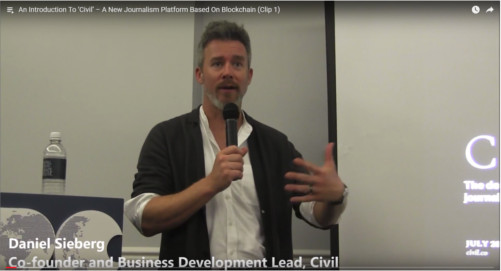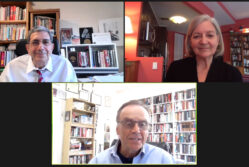Event Coverage Highlight

‘Civil’ Platform Offers Help for Newsrooms and Journalists

By Chad Bouchard
The litany of challenges facing the news industry is daunting. Traditional journalism has a trust problem. Newsrooms have a sustainability problem. Armies of bad actors, social media gate keepers, fake news makers, hired trolls and hostile politicians press against the gates.
But a new project is looking for ways to thwart these threats, to help newsrooms find sustainable models, to foster a trusted community of content creators, and eventually help journalists get paid for their work.
The secret weapon: blockchain and cryptoeconomics.
On July 11, former OPC Governor Daniel Sieberg presented an overview of “Civil,” a new platform for journalists that uses cryptocurrency to create a decentralized marketplace that will be governed by holders of Civil “tokens” based on Ethereum’s virtual currency system.
“You can think of this as a cooperatively owned platform,” Sieberg said during the program. “Imagine building a platform in service of journalism. This is what we are trying to do.”
Sieberg is a co-founder and business development lead at Civil. He said the company is building a whole system for journalists where community members who care about journalism can challenge each other’s work, hold other members accountable, and work together to create sustainable business models.
The government and management of the community is up to “citizens” who acquire a stake in the community by purchasing Civil tokens.
The company, which employs about 25 people, is developing a “à-la-carte menu” of alternative economic tools for community members, including crowd funding, micro-tipping or subscriptions that newsrooms can tailor to monetize content via the platform.
Past OPC President Allan Dodds Frank, who attended the program, was encouraged to hear that Civil is working on ways for news services and individual journalists to detect where their content is published.
“Allowing journalists to track how their work is used and reused would give them at least a shot at getting paid for all the rights to their work. And if Civil can perform that function, as ASCAP or BMI did for musicians, it would be a great service to all, he wrote in an email after the program. “More journalists would do better, and they would create more in-depth work and more people might be inspired to pursue the craft.”
But Dodds Frank also raised concerns about the potential for bad actors to subvert the project’s integrity.
“Civil as a big idea is promising but if it really gets going, I will be wondering whether some big dark forces will try to control it through token purchases,” he said.
Sieberg acknowledged that the company has spent a lot of time considering those risks, and put systems in place to protect the community. The economics of cryptocurrency prevent large-scale token purchases, and the only way to acquire tokens after the platform launches will be from existing members.
The community has a constitution to support integrity among member newsrooms, and is governed by an elected, term-limited council that can step in and block bad actors or those who do not fit with the community’s mission.
Civil recently announced that former NPR CEO Vivian Schiller will lead the company’s foundation, and shepherd the constitution and help to define what does – and does not – constitute ethical journalism on Civil.
The company has been recruiting newsrooms and projects with seed grants, and is preparing for an imminent launch with 100 full-time journalists across 13 independent newsrooms already on board.
Sieberg previously worked on Google News Lab and Google for Media, and before that he worked in broadcast news networks such as ABC, CBS and CNN.



